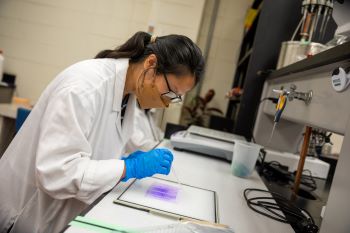
Wanted: The next generation of food ingredients
The Plant Protein Innovation Center is breaking down barriers to deliver sustainable solutions.
When it comes to building a better veggie burger, developing a more delicious plant-based beverage or cooking up protein-rich pasta alternatives, the food industry is racing to keep up with consumer demand.
Plant proteins are soaring in popularity among those in pursuit of options they feel are healthy, sustainable and support their lifestyles. According to a report by Bloomberg Intelligence, the plant protein market could reach $162 billion by 2030 — making up 7.7% of the total protein market globally. At the University of Minnesota, an interdisciplinary research center is taking a collaborative approach to finding solutions.
The Plant Protein Innovation Center (PPIC) was founded in 2018 to bring together researchers and industry experts to study and produce sustainable plant protein ingredients and products that are nutritious and acceptable by the consumer in terms of texture and flavor.
“We’re listening to what the consumer is asking for and we’re listening to industry needs, and it’s all underpinned by what’s good for our environment,” said Pam Ismail, PPIC Founder/Director and Professor in the Department of Food Science and Nutrition at the University of Minnesota College of Food, Agricultural and Natural Resource Sciences (CFANS). “The PPIC is where we come together to grow our research and accelerate progress.”
A bridge between academia and industry
The PPIC is the first center of its kind in the nation for plant and other alternative proteins, working all the way from breeding and genetics to upstream and downstream processing, formulation, and marketing. Its research philosophy is to focus on challenges and opportunities identified by the industry while also addressing global concerns about sustainable food production.
This was a notion that appealed to Christina Connelly, trade commissioner for the Consulate General of Canada, based in the Twin Cities. It’s her job to help Canadian businesses find opportunities in Minnesota and surrounding states, and to connect with U.S. companies who may be looking to expand to Canada. With a plant “Protein Highway” initiative already in the works between the Upper Midwest and Canadian prairies, she saw the benefit of establishing a centralized research hub.
“There is still so much untapped opportunity in this space, but the research had been siloed at different universities and organizations,” said Connelly, who joined the PPIC Executive Board two years ago. “By centralizing research, the belief is that rising tides lift all boats. There has been a realization that to grow quickly and meet evolving consumer demands, we need to be collaborative.”
Global ingredient solutions provider Ingredion was among 14 founding members of the PPIC. The Westchester, Illinois-based company has continued to find value in contributing to the center’s research and connecting with others in the plant protein community.
“The food industry needs fundamental knowledge on plant proteins; from their synthesis in the plants to the point of incorporating them into the diet. However, there is a gap between academic researchers and the food industry in utilizing the research outcomes in the commercialization of plant protein ingredients,” said Nagul Naguleswaran, protein chemistry lead at Ingredion and PPIC Technical Committee member. “The PPIC serves as a bridge between academic researchers and the food industry.”
Today, the center has more than 35 member organizations, which include businesses that span the supply chain. Recently, Microsoft became the PPIC’s newest partner to develop data management tools and AI-based prediction models specifically for plant protein research.
The PPIC also collaborates with other universities and institutions in the U.S. and abroad. These partnerships provide a diversity of research and perspectives that are needed to develop innovative solutions to real-world problems.
Complex challenges, global impact
The challenges that the PPIC is trying to address are complex: how to make plant proteins behave more like animal proteins in formulations; how to minimize processing to meet consumer demands for clean labels; how to maximize the food ingredient potential of new protein crops; and many more.
University of Minnesota students are involved in all aspects of the research. Graduate Research Assistant Holly Husband has done a little bit of everything at the PPIC, starting as an undergrad. Her work right now is focused on improving the functionality of pea protein.
“My current research is about making pea protein more appealing for consumers who are looking to incorporate plant-based foods into their diet without compromising on sensory attributes,” she said. “The PPIC has been really integral in making connections with the industry and figuring out how we can help meet the needs of the consumer population.”
It’s a population that is demanding more diverse, plant-based sources of protein and driving big changes in the global food system.
“This is not about one type of protein being better than the other; this is about sustainable nutrition for everyone. It’s clear that plant proteins need to be part of the solution to feed a growing population,” said Johan Ubbink, head of the Food Science and Nutrition department at CFANS. “The work being done at the PPIC and the contributions of U of M students will impact diets worldwide.”
Impact Winter 2022: Table of Contents
A shortened version of this article was featured in Impact, a quarterly print publication from CFANS.








